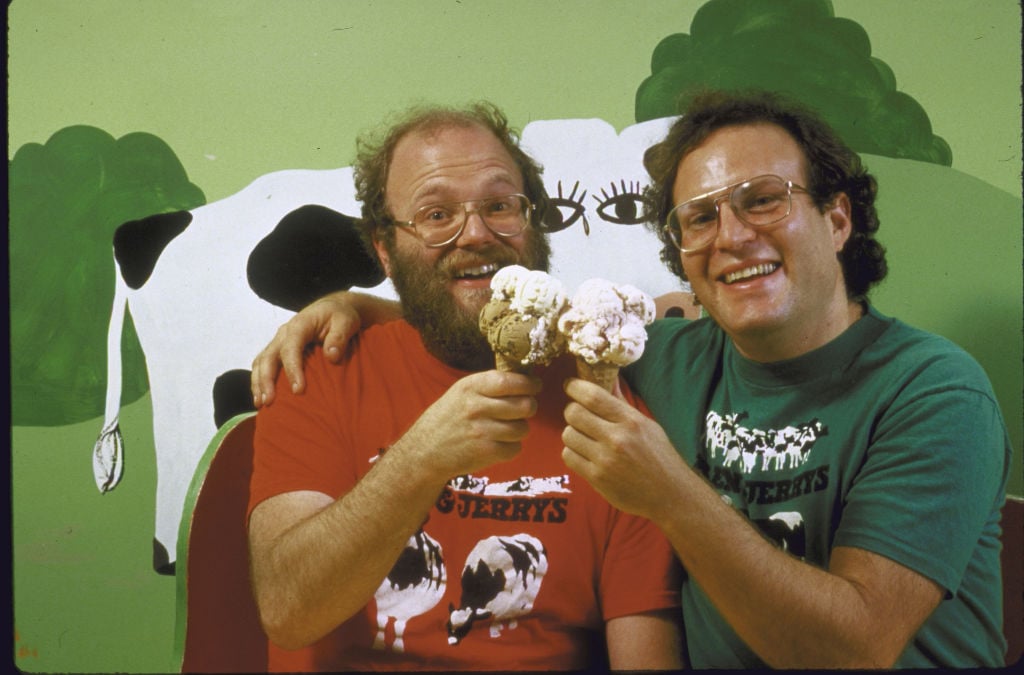Ben & Jerry’s, the renowned ice cream company, has evolved from humble beginnings into a billion-dollar global brand. However, its journey has been marked by unexpected corporate conflicts and a steadfast commitment to progressive values amidst commercial challenges.
From Gym Class to Gas Station
The story of Ben & Jerry’s traces back to a seventh-grade gym class in Merrick, New York, where two friends—Ben Cohen and Jerry Greenfield—first met. Later reconnecting in their twenties, they decided to start a business together in 1977, both feeling somewhat adrift. Cohen was attempting to sell pottery, while Greenfield was facing setbacks in his aspirations for medical school.
After considering various trendy snacks, the duo chose ice cream due to its lower production costs. They invested in a $5 Penn State correspondence course on ice cream production, which included mailed textbooks and open-book exams. With a combined investment of $12,000—each contributing $4,000 along with a loan and familial assistance—they opened their first scoop shop in a derelict gas station in Burlington, Vermont, in 1978.
Why the Chunks?
Cohen’s struggle with anosmia, a condition that limits his sense of smell and taste, directly influenced the brand’s signature approach to ice cream. Recognizing that texture would enhance the product for him, he and Greenfield incorporated a variety of mix-ins—such as brownie bits, cookie dough, and various swirls—into their offerings. This emphasis on texture became fundamental to the brand’s identity.
By the mid-1980s, Ben & Jerry’s witnessed rapid growth, with pints appearing in grocery stores nationwide. The company went public in 1984, achieving a valuation of $30 million by 1987, equivalent to nearly $68 million today. The founders successfully defended their independence against corporate adversaries, including a fierce legal battle with Häagen-Dazs’ parent company, Pillsbury.
Selling Out Without Giving In
In 2000, the company was acquired by Unilever for $326 million—a figure comparable to roughly $600 million today. The decision was bittersweet for Cohen and Greenfield, who preferred to remain independent but faced the obligations of a public company. The acquisition included a stipulation allowing Ben & Jerry’s to maintain an independent board dedicated to its values and social activism.
While Unilever facilitated Ben & Jerry’s expansion into 43 countries, tensions persisted between the two entities. Conflicts arose over marketing strategies, ingredient selections, and political stances, culminating in 2021 when Ben & Jerry’s announced it would halt sales in Israeli-occupied territories, citing human rights concerns. This decision spurred backlash, leading to boycotts and lawsuits, and resulting in Unilever selling the Israeli branch without board approval. The company subsequently initiated legal action against its parent.
The fallout continued, with prominent leadership changes and mounting pressure from investors regarding the brand’s political engagement. Recently, co-founder Ben Cohen was arrested during a Senate protest concerning U.S. aid to Israel.
The Breakup and the Buyback Attempt
In March 2024, Unilever proposed a spin-off of its ice cream division, which includes Ben & Jerry’s, citing sluggish growth in the sector. Analysts estimate this division generates approximately $9 billion in revenue annually, but Ben & Jerry’s sales experienced only a 2.3% increase in 2023—the lowest among Unilever’s brands.
For Cohen, this presented an opportunity. In 2025, he initiated a campaign to buy back Ben & Jerry’s from Unilever, seeking investors who align with the brand’s activist values. “If you love us, let us go,” he urged, appealing to Unilever for independence from corporate restrictions. However, Unilever has thus far maintained that Ben & Jerry’s is not available for sale as a standalone entity.
The independent board established during the 2000 acquisition remains protected, underscoring the complex dynamics of corporate governance that have shaped the narrative of Ben & Jerry’s.
A Company With a Soul
Ben & Jerry’s transcends the realm of ice cream; it embodies a set of values that resonate with millions. This ethos has cultivated a dedicated customer base, even as it alienates some others. Cohen and Greenfield, now in their 70s, continue to reside near their Vermont headquarters, actively engaging with franchisees and advocating for various social causes.
What began in a gas station with a modest investment now generates nearly $1 billion in annual revenue. Despite its success, the company’s future—be it corporate or independent—remains uncertain.

Meet William, a proud Bethel University alumnus with a fervent passion for lifestyle and culture topics. His keen interest doesn’t stop there; he’s also deeply engrossed in current events of all kinds. William dedicates himself wholeheartedly to this site, thriving on the collaborative energy he shares with Suzanne, his long-standing partner in crime.
Having navigated their university courses side by side for years, their teamwork on the site is nothing short of dynamic. Together, they bring a unique blend of insights, proving that two heads are indeed better than one in delivering compelling content.













